Twenty years ago, there were no social media marketers. And in the couple of decades since the profession was invented, the role has evolved as rapidly as social media itself.
Today, social media professionals wear many hats, juggle countless tasks, and have their hand in virtually every part of the business.
Let’s take a look at what it means to be a modern social media marketer and what the future holds for the profession.
You focus on making connections first.
Today, the person behind the social media accounts — their personality, authenticity, and ability to connect and engage with others — is key to the success of a brand.
More than 80% of consumers use social media to engage with companies, and Instagram leads the way with 36% of its users following a brand.
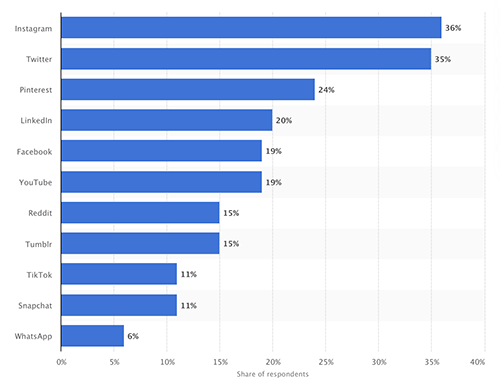
These users don’t click “follow” to be advertised to though.
In addition to learning about promotions, they want to be entertained, educated, and inspired. And they want to connect with people.
“Brands often have a push mentality, about getting content out into the wild and never really focus on how to build a relationship,” says Jerry James Stone, a chef and food blogger who’s amassed hundreds of thousands of followers. “Social media marketing is a balance of content and community. Brands and marketers often get bogged down in pushing products and skip over the things that connect people.”
In 2020, many brands tried to capitalize on users’ increased social media activity during the pandemic by marketing heavily to them. This ultimately backfired because people were turning to social media to make connections — not purchases.
The brands that got social media right during the pandemic were those that focused on authenticity and connection first.
This approach “may not drive the sales that product-focused posts and Stories drive on Instagram, but they build deeper connections with customers and generate engagement that goes beyond likes and comments,” says Leo Strupczewski, vice president of growth at Repeat. “And for brands playing the long game? That matters.”
The most successful social media marketers are those that are skilled at making authentic connections and building relationships. The brands with that kind of person posting, commenting, and responding on their behalf are the ones that users want to follow and engage with.
“Social media marketing has moved into this space that is more about authenticity,” Stone says. “Focusing on the nuances of what makes a strong relationship is a key factor. Fans want to connect with the brand on a personal level.”
You’re adaptable and stay in the know.
Social media platforms update, new channels emerge, consumer behavior changes, and once-effective strategies begin to wane, so a social media marketer’s job constantly evolves as well.
“It’s gotten more complex, and the speed of new features being released by social channels is a new kind of challenge,” says Danielle Stapleton, National Instruments’ global social media program manager and strategist. “It used to be a new channel — now it’s new channels and new features. It’s putting new pressures on marketing teams to create content in new ways and start thinking about how audiences consume differently in places.”
Clearly, it’s essential for social media marketers to stay informed about algorithm changes, new platform changes, and more.
In addition to this knowledge, they also need to be creative and willing to take risks because what works today may not work tomorrow.
How can social media marketers stay up to date?
There’s no shortage of resources to keep you in the loop, so find what works for you.
“I’m a big fan of Social Media Today’s Newsletter, which delivers a quick synopsis of every minor and major feature change on all of the major social media platforms,” says OutSystems Social Media and Communications Manager Mark Bilotta. “It also keeps you apprised of what features are in beta and how soon they could be implemented, which is great for pre-planning your social strategy.”
Stapleton, on the other hand, relies heavily on her connections.
“I lean on my professional network and agency partners I work with like EveryoneSocial,” she says. “I’m also kind of a nerd for Marketing Twitter and community discussion groups. I lurk a lot but often find great tips, links, and stories from other marketers. There’s a lot of ‘real talk’ in those spaces, and I appreciate that.”
Your job involves much more than just clicking ‘share.‘
Outsiders may think that social media marketers spend their days crafting Instagram captions and snapping pics around the office. While this is certainly the case — it’s not all they do.
To be a social media marketer today, you certainly need to be a top-notch copywriter and, at the very least, an amateur photographer. That’s only the beginning.
There’s a reason why so many organizations have entire teams dedicated to Facebook, Twitter, and TikTok. It’s a big job, and it’s not all hashtags, memes, and retweets.
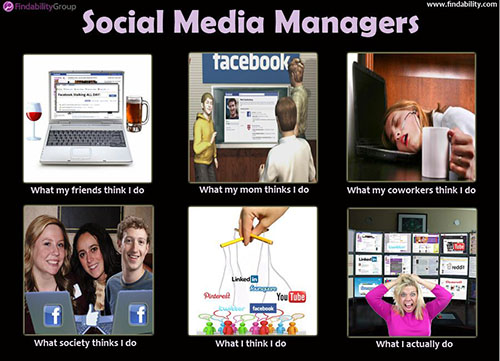
“I see a trend of social media manager roles growing past what we may always think about as ‘social,’ Stapleton says. “More and more, I see people in social media marketing roles doing podcasts, creating video content, etc. I think ‘social’ is starting to finally mesh into the rest of marketing. I am also seeing other parts of the business start to value social in new ways. I think everyone knows social and marketing are a good match, but employer branding and recruitment is a growing area of interest in my recent experience.”
Recently, National Instruments expanded its social media and marketing department to include the new Marketing Customer Journey Team, which focuses on “the pre-sales experience customers have with content,” according to Stapleton.
“We’re shifting the conversation from ‘social media’ to ‘channels beyond our website,’” she explains. “It may seem small, but it forces a new lens on the area and helps people see social media marketing as more than posting on Facebook or running ads on LinkedIn. We’re opening doors to new ways of understanding how our customers engage with us.”
You’re obsessed with data.
Sure, social media marketers need to understand important social metrics, know how to calculate engagement rate, and put together those end-of-month reports. But skillful social media managers delve into data, analyze it, and put it into action on a daily basis.
They use both quantitative (clicks and shares, for example) and qualitative data (like customer conversations and social listening) to identify trends, draw conclusions, and continually reassess their social strategy.
Plus, they rely on this information to provide insights to other departments and communicate performance stakeholders.
“Regardless of strategy, I have learned that if it’s not anchored in good data, it’s not going to get you far,” Stapleton says.
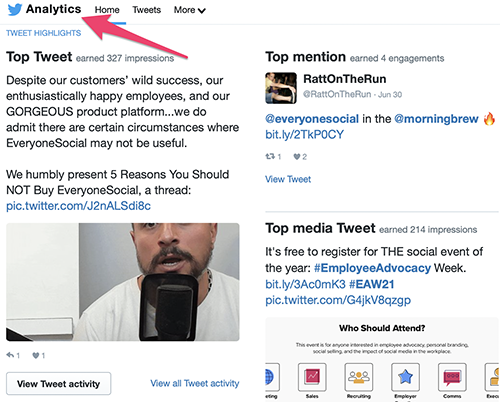
While every social network has its own analytics tools, social media professionals often invest in tools that provide them with additional data and insights.
Take a look at some of the best free and paid social analytics tools available today.
You’re the frontline for customer service.
Social media isn’t just a marketing tool — it’s also a customer service one.
Sixty-four percent of people would rather message a brand on social media than call the business, and 37% of consumers who use social media to make a complaint or ask a question expect a response within 30 minutes.
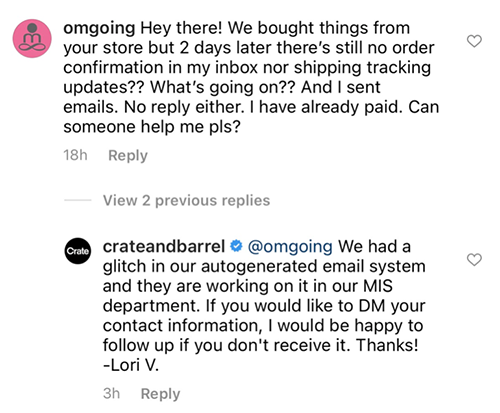
So social media marketers are often customer service representatives, which means they need the patience, empathy, and people-first attitude that such a role requires.
In addition to answering questions and complaints promptly via direct message, they must also respond to public comments in a positive, helpful manner that reflects well on the brand. And they must be able to de-escalate situations not only in the comments section of posts but also in real time via livestreams.
You know you’re not the only one who needs to post.
Ninety-eight percent of employees use at least one social channel, and half of them already post about their company online. The top social media marketers understand the significance of this — and they encourage it.
“We want to help employees become more than just employees,” says Sophie Gil, audience development lead at Buffer. “They can become evangelists, and they can become influencers or advocates. They know everything about the brand, so empowering employees to share on social media is the most genuine way that we can represent our brand because employees are a reflection of the brand itself.”
This is called employee advocacy, and the most successful brands have programs in place to nurture this type of sharing. Why? Because they aid in social selling, employee engagement, recruitment efforts, and more.
That’s why social media marketers help develop social media policies to guide employees, they use gamification techniques to incentivize shares, and they rely on platforms like EveryoneSocial to make social sharing easy and effective.
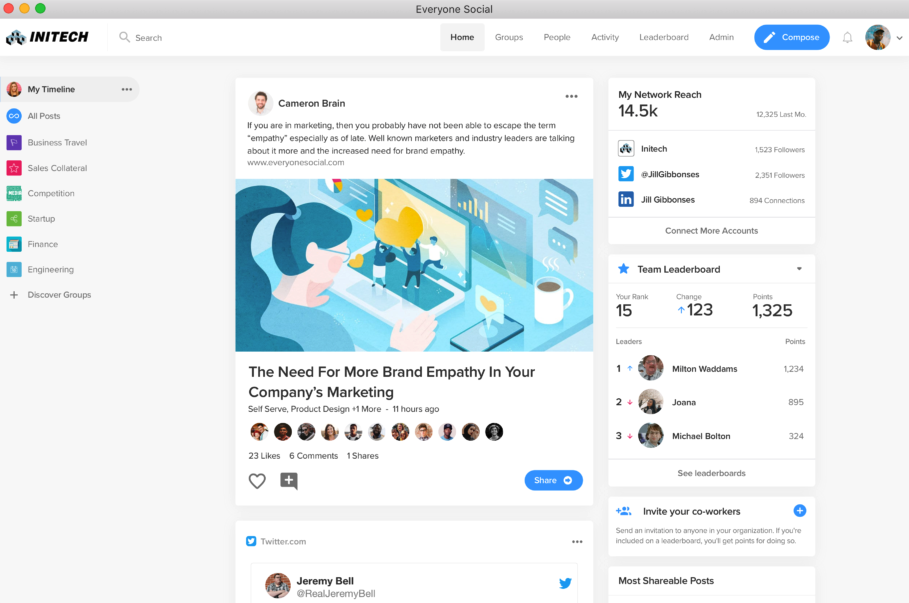
The payoff is immense: Brand messages reach 561% further when shared by employees and get eight times more engagement versus the organization’s social accounts.
The best social media marketers turn employees into advocates
The incredible statistics above only scratch the surface of what an employee advocacy program can do for your organization.
Advocacy efforts will transform your social media department, but they’ll also revolutionize sales, human resources, and more.
As a social media marketer, you’re often at the forefront of the next big thing, so lead your team into the next frontier.
















